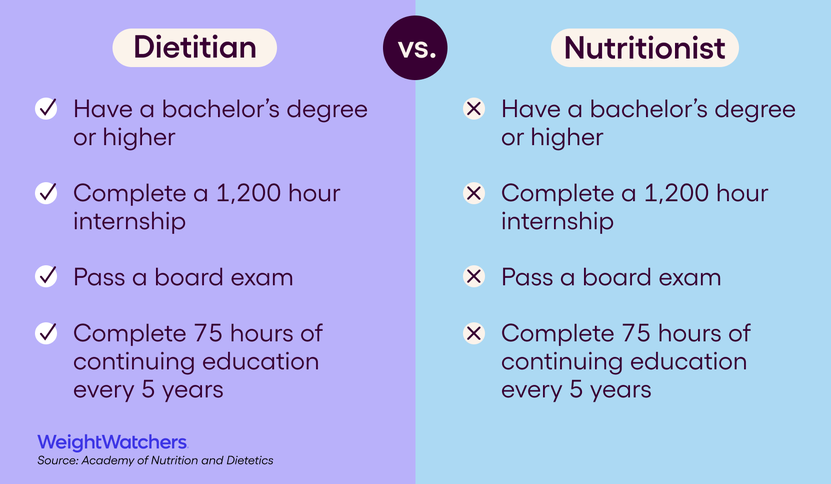What does a dietitian do?


The title “registered dietitian” should give you a pretty good idea of what they do — they work on your diet. But how (and why) they do that isn’t clear for most people. Do they just tell you what to eat? Are they someone you see only to lose weight? Is it just a person who’s into healthy eating or do they get some kind of formal training? So many questions. Let’s deep dive into all of it so you can understand whether they make sense for your health journey.
What is a registered dietitian (R.D.)?
A registered dietitian — sometimes also called a registered dietitian nutritionist depending on the provider’s preference — is, in essence, a food and nutrition expert. To use the title dietitian or have R.D. or RDN after their name, they must have a relevant degree from an accredited college or university, complete 1,200 hours of supervised practice (which means they take care of patients while being trained and overseen by a supervisor), pass a national exam, and continue with professional development throughout their careers, says Harlivleen “Livleen” Gill, RDN, president of the Academy of Nutrition and Dietetics, which is the governing body for R.D.s and RDNs.
While there are general R.D.s, some specialize in a type of nutrition in order to help people with a specific health condition or to treat a certain population. These board-certified specialties include obesity and weight management (CSOWM), gerontological nutrition (CSG), sports dietetics (CSSD), pediatric nutrition (CSP), renal nutrition (CSR), and oncology nutrition (CSO).
Why would someone need to see a dietitian?
A dietitian can help you with pretty much anything related to eating for your health. A few examples:
- You want general advice on how to improve your daily diet and get more nourishment.
- You want help creating a meal plan, to learn how to master healthy and effective grocery shopping, and a better understanding of your body’s needs.
- You are looking for specific help in changing your diet to impact a chronic health condition, such as heart disease, high cholesterol, high blood pressure, or diabetes (this type of counseling is known as Medical Nutrition Therapy, or MNT).
- You recently had surgery and want to ensure you’re eating the right foods for your recovery. This may be especially important for someone who has had abdominal surgery or bariatric surgery.
- You have an eating disorder and need support on your recovery journey.
- You want to change your weight — either lose some or gain some — and need advice on creating goals and the steps you can take to achieve them. This is exactly how the new WeightWatchers Registered Dietitian program can help you. You can meet virtually with an R.D. and, through insurance-covered visits, develop an action plan to help you reach your goals while still following your WeightWatchers weight-loss program.
What can’t a dietitian do?
While a dietitian is a healthcare provider, they can’t diagnose any health conditions or prescribe medications. “Dietitians should, however, work with your healthcare team to understand what medication you are taking and how that may affect your dietary needs,” says Gill. For instance, there are some medications that don’t interact well with certain foods (grapefruit juice and certain cholesterol-lowering meds don’t mix, as one example), and those on GLP-1 weight-loss medications may need guidance on how to prioritize protein and nutrients while losing weight. This is one benefit of being a member of WeightWatchers Clinic — you have a team of experts, including a dietitian, who can help you make the best dietary choices while losing weight on a GLP-1.
Nutritionist vs. dietitian
You may find that, when it comes to dietitian vs. nutritionist, some people use the terms “nutritionist” and “dietitian” as if they are interchangeable, but they are not. A rule of thumb to remember, according to Caroline Susie, R.D., a Dallas-based registered dietitian and spokesperson for the Academy of Nutrition and Dietetics: “All dietitians are nutritionists, but not all nutritionists are dietitians.” A dietitian, as noted by the R.D. or RDN after their name, has to go through formal training.
A dietitian (R.D.) or registered dietitian nutritionist (RDN) must:
- Hold a bachelor's degree in nutrition or a related field from an accredited university (starting in 2024, new R.D.s will be required to have a master's degree)
- Complete a 1,200-hour dietetic internship program
- Pass a national examination administered by the Commission on Dietetic Registration (CDR) to obtain their license
- Complete 75 hours of continuing education every five years to keep their license
None of the above is true for a nutritionist. “Anyone can call themselves a nutritionist, even if they are without formal training,” says Gill. While there are certain nutritionist credentials that show they’ve had some training — for instance, a CNS certification comes from the Board for Certification of Nutrition Specialists (BCNS) and means someone usually has an advanced degree and completed 1,000 supervised internship hours — most aren’t that rigorous. “You can even get certain nutrition certificates over weekend seminars,” says Susie.


Does insurance cover dietitian visits?
So, are dietitians covered by insurance? Oftentimes yes. For people with certain chronic health conditions, such as diabetes or kidney diseases, Medicare and many insurance companies cover nutrition counseling by a registered dietitian. The Affordable Care Act also requires marketplace health plans and many others to cover preventive services (including nutrition counseling) for adults at risk for chronic conditions. There are some private insurance plans that provide coverage for certain wellness services, which may include nutrition counseling, even if you aren’t at risk for a chronic condition. Talk to your insurance provider about what may be covered under your plan.
How to find a registered dietitian
A few things to keep in mind when you’re seeking help:
- Before you start looking for an R.D., think about what you want to accomplish. This will help you narrow down your options based on their areas of expertise (some have advanced training in diabetes while others may specialize in helping people after weight-loss surgery) and will help you start off the conversation when you reach out to these professionals, says Susie.
- Check out the Academy of Nutrition and Dietetics’ Find a Nutrition Expert tool. This will help you narrow down dietitians by location, specialty, and more.
- Review credentials to make sure you’re really dealing with an R.D. or RDN. A lot of nutritionists can have letters after their name implying they’ve gone through training, but only those with R.D. or RDN after their name have gone through the lengthy training process to be a dietitian.
- Seek out someone who can work with any specific cultural needs you have. You want to work with someone who understands how your culture (dietary restrictions or preferences, holidays, and other things) could affect your care.
- Set up a consultation to ask questions about their background, philosophy, and counseling approach. Find out nitty-gritty stuff like whether they prefer in-person or virtual visits and how often they like to meet, says Susie.
Take the work (and guesswork) out of finding an R.D. by using WeightWatchers’ new dietitian offering. All members now have access to registered dietitians, who can provide personalized nutrition counseling to help you reach your own unique health goals.
The bottom line
Dietitians can be a key part of your health journey, and are specially trained to help you with a variety of health conditions and needs — from how to eat while undergoing cancer treatments to learning to grocery shop after a food allergy diagnosis. Unlike people who solely refer to themselves as nutritionists, registered dietitians go through an intense and lengthy training. When you’re looking for health with your diet, do your research to find a qualified R.D. who meshes well with your goals.
FAQs
Many people have found working with a dietitian to be a tremendous help in creating a healthy diet plan, planning for pitfalls and trouble spots, and having accountability. If you put in the work — trying to follow your R.D.’s advice as well as you can, being honest about problems and pitfalls that may crop up — you should get a lot out of your consultations with a dietitian, says Gill.
Dietitians can be a beneficial tool to help you lose weight. You’d work together to identify your goal weight, look at your current diet, make key adjustments, and also talk about a range of other lifestyle factors, such as exercise and sleep. A dietitian can also talk to you about consulting with doctors who can — if you qualify — prescribe weight-loss medications such as GLP-1s, says Gill. Dietitians cannot prescribe these medications, but can (and should) work with your healthcare team to make sure your diet is supportive to your health goals while on weight-loss medications (something that happens for all WeightWatchers Clinic members).
This can vary based on the clinician, but most initial appointments with a dietitian involve talking through your medical history, looking at your current diet, lifestyle habits and preferences, and creating your goals (both long-term and short-term). This is your time to be honest and open — and feel out if you feel like the R.D. is someone you can really work with to achieve your goals.
This content is for informational purposes only and does not constitute medical advice, diagnosis or treatment. It should not be regarded as a substitute for guidance from your healthcare provider.
Board-certified specialties: The Academy of Nutrition and Dietetics (2024). “About RDNs and NDTRs.” https://www.eatright.org/about-rdns-and-ndtrs